 print preview
print previewback IRENE ZIEGLER | The Little Lion
Act Two
Scene 1
(Winter. 5:00 a.m.
PROJECTION: Darkness.
SOUND: Tolling.
ENSEMBLE as in top of Act 1, but they face upstage.
Low backlight reveals them in silhouette. They are still.
A loud speaker plays Wagner.
A figure collapses.
Then another.
GERMANS shout in German from time to time. Perhaps they bully those collapsed to their feet.)
GERMANS
1!
2!
3!
. . .
25!
26!
27!
. . .
108!
109!
110!
. . .
631!
632!
633!
(CAPTAIN LEITUKIS comes through the throng.)
CAPTAIN LEITUKIS
Where is Laibale Gillman!? . . . You!
(JOEL turns around.)
Where is he?
JOEL
He is not well.
CAPTAIN LEITUKIS
Fetch him.
JOEL
He will not come, Valter. Find somebody else to pick on.
(CAPTAIN LEITUKIS knocks JOEL to the ground.)
CAPTAIN LEITUKIS
You will call me Captain Leitukis. Get up!
(With difficulty, JOEL gets up.)
Take me to him.
(CAPTAIN LEITUKIS and JOEL exit.)
Scene 2
(The Gillman home in the ghetto.
LAIBALE lies on the floor.
CAPTAIN LEITUKIS enters.)
CAPTAIN LEITUKIS
Get up.
LAIBALE
No.
CAPTAIN LEITUKIS
You must be counted. Get up and go outside.
(Beat)
Can you hear me Laibale Gillman?
(LAIBALE covers his ears.)
LAIBALE
Not anymore.
CAPTAIN LEITUKIS
You refuse to be counted?
LAIBALE
Yes.
CAPTAIN LEITUKIS
The garage is full of motorcycles that need repair. Get out there right now, be counted, and get to work!
LAIBALE
No.
(CAPTAIN LEITUKIS holds a pistol to LAIBALE’s temple.)
CAPTAIN LEITUKIS
You think I won’t do it?
LAIBALE
I want you to do it.
CAPTAIN LEITUKIS
I will give you to three.
LAIBALE
Oh, for the love of God. Just shoot me.
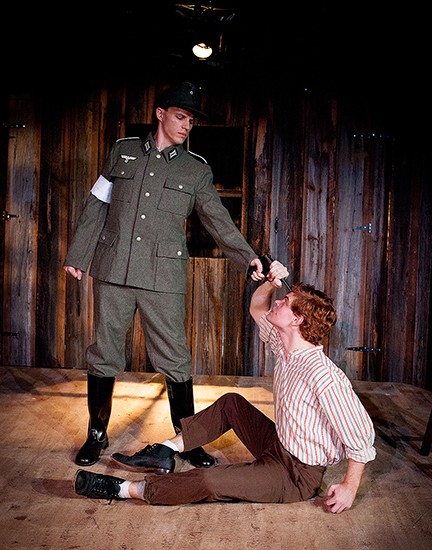 |
| Matt Hackman, John Mincks Photo by Robyn O’Neill |
CAPTAIN LEITUKIS
One.
LAIBALE
Two. Three. Bang.
(Beat)
What’s the matter, Valter?
CAPTAIN LEITUKIS
You will call me Captain Leitukis.
LAIBALE
You’ve wanted to kill me ever since I won that motorcycle race. Well, now’s your chance. Do it.
CAPTAIN LEITUKIS
Get outside and be counted!
LAIBALE
Why should I do anything for you when my mother is at the Ninth Fort?
CAPTAIN LEITUKIS
Because I said so!
LAIBALE
I’m not afraid of you. I’m not afraid of anything. You locked up my mother for trying to feed her family, Valter. My mother. Remember her? She made dresses for your mother. She stood up to your father. She treated you kindly even when you didn’t deserve it.
CAPTAIN LEITUKIS
This has nothing to do with me. You will go outside to be counted, and then you will go to work.
LAIBALE
No.
I won’t. And you’re not going to kill me, either, because I’m the only one around here who knows the difference between a two-stroke and a four-stroke engine.
CAPTAIN LEITUKIS
Then I will kill one hundred Jews right now. And it will be on your head. What do you think of that?
LAIBALE
I think it will be on your head, Valter. Will that make you feel better? Knowing you’ve turned into a brute like your father?
CAPTAIN LEITUKIS
Leave him out of this!
LAIBALE
How did it feel when you saw Menachim die? Did you shoot him yourself, or did you just watch? Did you think of Esther, how much she loved him? Or is that just a word to you, like stick or bone?
CAPTAIN LEITUKIS
Stop talking!
LAIBALE
Why don’t you just kill your father and get it over with? Leave me and my family alone.
CAPTAIN LEITUKIS
I said, stop talking!
LAIBALE
Gladly.
(LAIBALE curls into fetal position, withdraws.)
CAPTAIN LEITUKIS
You have no idea, the pressure I am under! No idea!
(He kicks something.)
It’s not enough anymore to pledge allegiance, you have to prove it! Every day! They demand absolute obedience, this crowd. I have over one thousand Jews to count! It if takes one hour, if it takes five hours, they don’t care. In the cold, the rain, the snow. If the count comes out wrong, I have to do it again, over and over. I want to die, standing out there, and for what? I ask you, for what? So some idiots in Berlin can sit around and act like God, that’s for what. They are worse than my father, I swear to Christ. I wish they would all get in a boxcar and send themselves over a cliff.
(Beat)
I never said any of that, by the way.They would kill me, you know. You think you have it bad. Try being me for just one day, see how you like that. Marching the work brigade to the airport and back again—I have to account for every Jew who gets himself shot. We ask them to do one simple thing: get in the trench and throw the gravel back onto the landing strip. Simple. You’d think we were asking them to build the pyramids. It doesn’t take a genius. And they look at you, with their eyes so full of . . .
It’s no picnic, let me tell you.
(After another beat, VALTER lets down, looks around the room. He pokes a FALLEN ACTOR with a boot, touches this, inspects that, more curious than anything else.)
CAPTAIN LEITUKIS
So. What do you hear from Rebekkah? Does she ask about me?
(LAIBALE’s laugh, high and fey at first, builds to hysteria.)
CAPTAIN LEITUKIS
What is so funny?
That is enough.
Stop it, now.
Enough!
(LAIBALE covers his head with his arms. Eventually, he calms.)
CAPTAIN LEITUKIS
Do you remember Hans Bergoff?Fat kid. Squinty eyes. Always eating candy. He was younger than us.
LAIBALE
Barely. Why?
CAPTAIN LEITUKIS
One time he had this large lollipop. You know the kind? Round. Flat. Like a dish. Very big. As big as his head, almost. There were swirls in it, red and yellow.
LAIBALE
What about it?
CAPTAIN LEITUKIS
I wanted it.
Not all of it. Just a taste. I said to him, “Hans, I would like a taste of that lollipop.” And he said no. So I asked again. “I just want one lick and that is all.” Still, he says no. And he looked me in the eye and very deliberately licked that lollipop with the flat of his big, fat tongue.
LAIBALE
What did you do?
CAPTAIN LEITUKIS
Nothing. I just stood there, staring at him. And then suddenly my father was there, and he snatched the lollipop, hit Hans over the eye with it, and stuffed it back in his hand. And before Hans can cry out, my father is dragging me home by the ear. And when we get home, my father picks up a belt hanging on the back of the door and beats me with it.
LAIBALE
Why?
CAPTAIN LEITUKIS
I don’t know.
(Beat)
Hans had to have stitches over his eye.
LAIBALE
Your father is damaged.
CAPTAIN LEITUKIS
This is true.
LAIBALE
The Germans took his garage?
CAPTAIN LEITUKIS
Yes.
LAIBALE
I’m glad.
CAPTAIN LEITUKIS
So am I.
(Looks out window)
Will Kovno ever be the same, do you think?
LAIBALE
No. And we will remember.
CAPTAIN LEITUKIS
You will remember. Remember what?
LAIBALE
You. Me. My mother. The thousands dropping dead every day. The thousands more destined to die.
CAPTAIN LEITUKIS
What do you know about the destiny of thousands?
LAIBALE
(Beat)
Lollipops.
CAPTAIN LEITUKIS
What?
LAIBALE
Lollipops. Just as you said.
CAPTAIN LEITUKIS
I don’t follow.
LAIBALE
Say there are twelve lollipops on the table. A Nazi, a Jew, and a worker from Kovno all want the lollipops. The Nazi takes ten, leaving one each for the worker and the Jew. Then the Nazi turns to the worker and says, “You see that Jew? He wants your lollipop.” That is what we will remember.
CAPTAIN LEITUKIS
You want a lollipop?
LAIBALE
You’re not very bright, are you?
CAPTAIN LEITUKIS
That is not my job.
LAIBALE
What is your job, Valter?
CAPTAIN LEITUKIS
To get your ass outside to be counted, then in the garage to fix our damn motorcycles.
LAIBALE
Then I guess you will fail. Because I am not doing anything for you, ever again.
CAPTAIN LEITUKIS
Enough of this, Laibale. The motorcycles are broken down. I am forced to ride a bicycle. Really, I look ridiculous. Go outside and be counted.
LAIBALE
No. The entire German Army can ride bicycles for the rest of the war, for all I care.
CAPTAIN LEITUKIS
Go outside, then get to work!
LAIBALE
No! You took my mother!
CAPTAIN LEITUKIS
Fine!
Sergeant! Come here.
(SERGEANT enters.)
SERGEANT
Jawohl!
CAPTAIN LEITUKIS
Is there a motorcycle in the pool that actually runs?
SERGEANT
One, Herr Captain.
CAPTAIN LEITUKIS
Put this man on it and take him to the Ninth Fort.
SERGEANT
Jawohl. Come here, you.
LAIBALE
I’m not going anywhere.
CAPTAIN LEITUKIS
Take him to the Ninth Fort.
JOEL
No!
SERGEANT
Jawohl!
CAPTAIN LEITUKIS
Then have him find his idiot mother and bring them both back here so I can finish this goddamn count!
(Exit.
Lights out.
SOUND: Thunder, lightning, rain.
PROJECTION: Loudspeaker.)
LOUDSPEAKER
On Tuesday, October 28, 1941, at 6:00 a.m., all inmates of the ghetto, including children and the sick, are to assemble in the square at Demokratu Street, and line up in accordance with police instructions. Do not lock your apartments, cupboards, desks, or wardrobes.
Anyone found in the apartments after 6:00 a.m. will be shot on sight.
Scene 3
(A celebration.
PROJECTION: Archival sketch of musicians.)
GHETTO WORKER
Eat, drink, and be merry, for tomorrow we die!
(Great roar, followed by Lithuanian drinking song, possibly “Zingt un Tantst in Ridelekh”—“Sing and Dance in Circles,” slightly sped up. Yad Vashem, the World Holocaust Remembrance Center, writes of the song: “It describes daily life in the ghetto, in an ironic way: the immeasurable overcrowding and hunger overcomes the morals of the people, leaving them no other choice but to dance and celebrate in order to survive and forget their miseries.”
DR. ELKES enters.)
DR. ELKES
Enough! Do you want them to kill you for disturbing their sleep?
MAN #1
What does it matter if they kill us now or in the morning, Dr. Elkes? At least this way, we do not leave our food and drink supply to them.
DR. ELKES
Go home to your families!
MAN #2
And do what? Snivel and pray to a God that has forsaken us?
ZOSIA
Please, Doctor. I have no family. Please tell them I am your wife. It is my only chance to save myself. Without a husband, what chance do I have? None!
DR. ELKES
Go over there, Zosia.
Lola! She should not drink anymore. See to her, will you?
(LOLA guides ZOSIA away.)
Listen to me! You are overreacting. This is just a reorganization.
MAN #1
Reorganization! I like that. So much better than selection. You are starting to sound like them with their euphemisms.
ZOSIA
Some will be selected to live, others will be selected to die. Isn’t that the way it will go, Doctor?
MAN #2
We must resist!
DR. ELKES
No! They will shoot anyone who resists. Or hides. Or runs away. You must show them you are able to work. It is the only way to save yourself.
MAN #1
I would rather die.
DR. ELKES
You would rather live. Listen to me. Listen to me! You want to sing? Sing about life! Sing about God. Sing about our strength and dignity as a people.
MAN #3
I would rather sing about beer.
(He shouts the Lithuanian equivalent of “Cheers!” (“Į sveikatą!”) Others salute in kind. DR. ELKES loses control of the room.
RABBI SHAPIRO stands and sings kaddish for the dead.
Lights change to feature RABBI.
After a bit, all settle down, eventually exit.)
RABBI SHAPIRO (Sings the Mourner’s Kaddish)
Yit’-ga-dal v’yit-ka-dash sh’mei ra-ba,
b’al-ma di-v’ra chi-ru-tei, v’yam-lich mal-chu-tei
b’chai-yei-chon uv’yo-mei-chon
uv’chai-yei d’chol-beit Yis-ra-eil,
ba-a-ga-la u-viz-man ka-riv,
v’im’ru: A-mein.
(All but RABBI SHAPIRO leave the stage.)
Scene 4
(The selection. Demokratu Square.
Light on RABBI SHAPIRO. He writes.
PROJECTION: Archival manuscript.)
RABBI SHAPIRO
There was nothing I could do. A man can only stare into the face of evil for so long, can only listen to the cries and pleas of the bereaved before shutting down. Thank God for Dr. Elkes. Without him, more may have resorted to self-annihilation.
The square was surrounded by machine gun emplacements. As thirty thousand ghetto inmates assembled into columns, armed Lithuanian partisans, some of them former neighbors, looted their houses and killed anyone they found hiding there.
The thirty thousand stood in the square, waiting for something to happen. Hours went by.
(SOUND: Tolling effect.)
At 9:00 a.m., a Gestapo entourage arrived, and with the wave of a baton, Master Sergeant Rauca sent a column of Jews to the left and another to the right. The selection had begun.
MASTER SERGEANT RAUCA (eating the last of a sandwich)
It smells most unpleasantly of Jews today. <
(He throws crust on the ground. Several Jews run after it, but he grinds the crust into the dust with his boot.)
You, there. To the left. The rest of you, to the right.
(A CAPTAIN whispers in his ear.)
All of you to the right then.
(Beat)
Don’t make me repeat myself! Schnell!
RABBI SHAPIRO
To the left of Rauca, it came to pass, was the “good” line. In cases where members of a family were separated, Dr. Elkes tried to intervene, and at times even succeeded in transferring whole families to the left. He saved hundreds, but almost ten thousand others were marched to the Ninth Fort and murdered.
(MOSHE, SHEINA with Sara, ISRAEL, ANOTHER SHEINA step up.)
DR. ELKES
Moshe! Where is your mother and Laibale?
MOSHE
I wish I knew! The last I heard, Laibale was taken to the Ninth Fort. Mama was taken there yesterday for smuggling through the fence.
DR. ELKES
God help us all.
ANOTHER SHEINA
Will they put us in the bad line because of Nese, Doctor?
SHEINA
Can you talk to them?
DR. ELKES
They will not separate you. The little one. She is sick?
SHEINA
I gave her something so she would sleep. The Germans are very cruel to crying babies.
DR. ELKES
Try to wake her. They must see she is healthy.
ISRAEL
Laibale!
(LAIBALE and NESE are delivered at gunpoint. The family clings to them.)
MOSHE
Mama, thank God!
SHEINA
We thought we lost you both.
ISRAEL
What the hell happened?
NESE
Laibale came and got me. He saved my life.
(Coughs)
DR. ELKES
Step up. It is time. Moshe, as the eldest, you should speak for the family.
(A nervous MOSHE and the family are before RAUCA.)
MOSHE
Good morning, Herr Rauca.
MASTER SERGEANT RAUCA
Who are you to address me by my name?
Who is this man? Who told him to talk?
DR. ELKES
His name is Moshe Gillman, Herr Rauca. I told him he should speak for the family.
MASTER SERGEANT RAUCA
Speak? You mean like a dog?
DR. ELKES
No, Herr Rauca, like a man.
MASTER SERGEANT RAUCA
I think you should bark for me, family man.
DR. ELKES
Herr Rauca, this family has many talents, which will support the Reich. The mother is an excellent seamstress, and the younger brother—
MASTER SERGEANT RAUCA
That is enough out of you, Dr. Elkes. You have been getting on my nerves for some time now. Go over there, please. I wish to hear this man bark like dog.
DR. ELKES
This is unnecessary, Herr Rauca.
MASTER SERGEANT RAUCA
I don’t wish to hurt you, Dr. Elkes. I rather like you. But if this man doesn’t bark for me in two seconds I will remove your nose with this baton. Am I clear?
(LAIBALE barks. HERR RAUCA is taken aback, but before he can object, LAIBALE goes into full dog boogie. DR. ELKES slowly ushers MOSHE out of view. LAIBALE caps off his performance by nuzzling HERR RAUCA, who pets him.)
MASTER SERGEANT RAUCA
Very good! You see? What is so wrong about that? A little laughter to lift the spirits. What is your name, dog?
LAIBALE
Laibale Gillman.
MASTER SERGEANT RAUCA
Laibale Gillman. You are very ugly. Has anyone ever told you that?
LAIBALE
Yes, Herr Rauca. Arf!
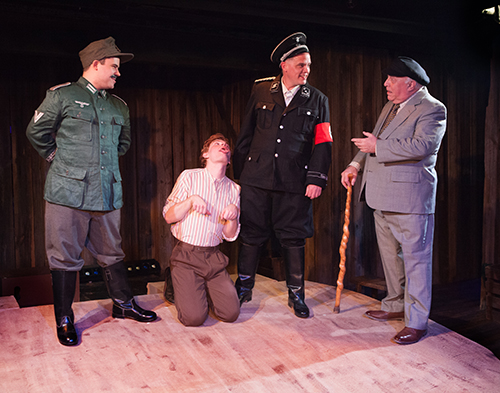 |
| Chris Craig, Billy Christopher Maupin, John Mincks, John Hagadorn Photo by Robyn O’Neill |
MASTER SERGEANT RAUCA
Can you do anything other than bark like an ugly dog?
LAIBALE
I am an excellent motorcycle mechanic, sir.
MASTER SERGEANT RAUCA
Not just any motorcycle mechanic, but an excellent motorcycle mechanic!
LAIBALE
Yes, sir. The Reich has excellent motorcycles, but they can always use excellent mechanics.
MASTER SERGEANT RAUCA
And so it can, ugly dog. All right. Get in the left line.
Next!
You there? What are you doing?
(MASTER SERGEANT RAUCA exits.
LAIBALE falls to his knees and vomits. NESE assists him, wipes the corner of his mouth with her dress.)
NESE
What would we do without our little lion?
Shh, shh. Don’t cry.
We’ve made it through another day.
(They cling to each other.)
RABBI SHAPIRO
And they were through. After twelve hours of not knowing, they were spared with a wave of a baton. Others faced a different fate.
(Intones quietly as ZOSIA comes forward)
Yit-ga-dal v’yit-ka-dash sh’mei ra-ba,
b’al-ma di-v’ra chi-ru-tei, v’yam-lich mal-chu-tei
b’chai-yei-chon uv’yo-mei-chon
uv’chai-yei d’chol-beit Yis-ra-eil,
ba-a-ga-la u-viz-man ka-riv,
v’im’ru:
(ZOSIA smiles and smooths her hair, mimes flirtation as RABBI SHAPIRO continues to speak. We sense it is not going well. She tries a different tactic. Eventually, she accepts her fate and is still.)
RABBI SHAPIRO
In one day, the Big Action at Demokratu Square condemned almost ten thousand men, women, and children to death, first of all, for being Jewish, and then for being old, sick, or superfluous. Their Lithuanian neighbors, drunk and armed to the teeth, marched them in columns to the Ninth Fort, where they were forced to line the edges of a huge pit. Wave after wave, layer upon layer, they were shot and pushed, shot and pushed, over and over, until the bodies filled the pits. It took one day to shoot them, but a few days for all of them to die. Dr. Elkes, under siege by grieving families, all of whom were missing a father, a son, a nephew, a grandmother, did what he could to save a few more, but nearly lost his own life for his trouble.
Thus recorded this last day of October. 1941.
(Sings)
A-mein.
(He ceremoniously closes the book on the diary entry.)
Scene 5
(RABBI SHAPIRO’s makeshift classroom.
PROJECTION: Archival picture of students.)
GEORGE
You can make your own camera, but you must not get caught taking a picture. I take pictures through the buttonhole in my coat, you see? I made my camera myself. It is easy, and I can get you x-ray film from the hospital. I fix the x-ray machines, you see, and—
RABBI SHAPIRO
I must interject. Excuse me. I will be brief.
Children, we all know the unlawful procurement of goods is called theft, and this is a sin in the eyes of God.
GEORGE
I don’t steal it, Rabbi, I barter for it.
RABBI SHAPIRO
Ah. Acceptable. Go on, George.
GEORGE
Anyway.
You will need a box with a lid . . .
(Holds up each object in turn)
. . . a thin piece of metal, a needle that will pierce the metal, a knife, sandpaper, and black tape of some kind. Electrical tape is good. I can help you find these things.
And of course . . . film.
Okay! Paint the inside of the box and lid black like I did here. Put the lid on and tape all around so light can’t get in. Light will ruin your film and your photograph.
Poke a tiny hole in the metal shim with a needle. Make a pinhole opening in the box, and tape the metal piece behind the pinhole opening with black tape.
To make a shutter, which is just a flap that covers the pinhole from the outside, fold pieces of black tape together until you have a flap, then tape the flap, like so.
In darkness, place a piece of film to the inside of the box across from the hole. Put the lid on, and make sure the shutter is closed.
The camera works best when it is bright, so in here, I’ll have to hold the shutter open for thirty seconds or more. Who wants to have their picture taken?
(GEORGE frames the moment, and all but ESTHER freeze.
PROJECTION: Archival picture of students.
ESTHER wears mittens. She is a stranger, reduced version of her old self but clearly cares about children. She sketches.)
ESTHER
Gesture drawings are studies of a form in motion.
A gesture drawing is messy and loose. The point is to capture the essence of the form—the most important part is the movement and shape.
George took a photograph last week. It is a good one to practice with. Lots of interesting action going on here.
(She shows it.
PROJECTION: Begin video of ESTHER sketching. It is video of an artist sketching the photo above. The artist wears the same mittens so it looks like ESTHER is doing the drawing.)
Find the dynamic movement lines before defining your shapes. The easiest way is to look at the curvature of the spine. Hatch out a line similar to the spinal curve and start there.
Look at the position of the shoulders and how the arms extend. They also form dynamic action lines. Now, note the position of the hips and how the legs extend from the pelvis. Again, more dynamic line work. At this stage you should be creating a stick man skeleton.
Quick, quick, quick stick man skeleton.
See? This is the foundation of your gesture drawing. Now it is time to block in the head and neck, followed by the upper torso and pelvis. Do not make the upper body one piece, otherwise you will make your form look more like a barrel than a person. And we must always remember, children, we must always remember that these are people.
If you have time and remain safe from prying eyes, fill in some details: clothing, if they still have some; hair, if it hasn’t fallen out due to malnutrition; fingers and toes, unless lost to frostbite, and facial features—
Remember to keep your lines light and loose. Clear your mind; focus on form and movement.
Don’t think about the subject matter. Otherwise you could go crazy thinking who might be next. Because you don’t know who could be next. You mustn’t ask the question:
Who will be next?
(Now the sketch is completed and the archival photo is revealed.)
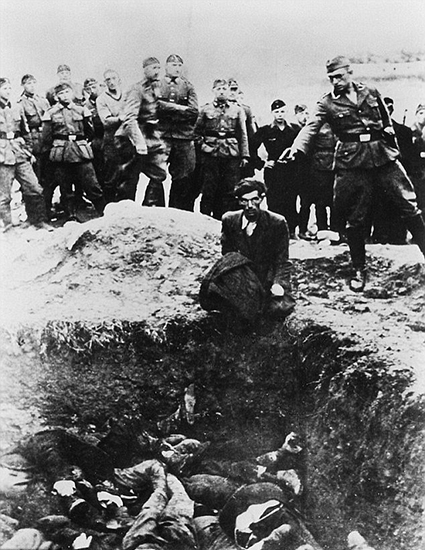 |
| By Heinrich Hoffman, 1941 From German History in Documents and Images, German Historical Institute (Archived in Bildarchiv Preußischer Kulturbesitz / Bayerische Staatsbibliothek) |
Scene 6
(Gillman family at home. MOSHE is agitated.
PROJECTION: Archival picture of “Sara.”)
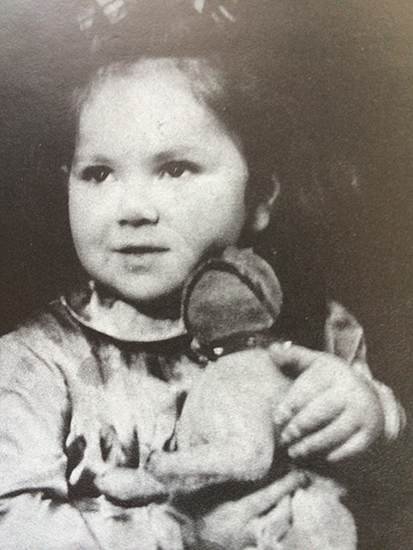 |
| From Hidden History of the Kovno Ghetto (1997) United States Holocaust Memorial Museum |
MOSHE
We have to get her out of here.
NESE
The hospital. We can pretend she is sick. She can be among the orphans.
MOSHE
God, no. They burned the last hospital to the ground. You want to risk Sara to such a fate?
ANOTHER SHEINA
We must all take chances, Moshe.
MOSHE
With due respect, Another Sheina, but we are not talking about a mink coat.
(ANOTHER SHEINA gets up abruptly, distances herself from MOSHE.)
ISRAEL
Perhaps she is safest here with us.
MOSHE
None of us are safe.
ISRAEL
They promised no more selections . . .
MOSHE
Don’t talk to me of their promises. She will leave this ghetto if I have to take her myself.
ISRAEL
They will shoot you both.
(SHEINA enters.)
SHEINA
What are we talking about?
ANOTHER SHEINA
Uh-oh.
MOSHE
Sheina . . . sit down. Please.
SHEINA
What is happening?
MOSHE
(Beat)
Love of my life, mother of our perfect child.
SHEINA
You’re scaring me.
ANOTHER SHEINA
He wants to send Sara out of the ghetto.
(NESE smacks her hand.)
Ouch!
SHEINA
You want to send Sara away!?
MOSHE
Please. Hear me out.
SHEINA
Moshe, how could you? She is our daughter.
MOSHE
There has been another directive. Babies are now forbidden in the ghetto.
SHEINA
Forbidden? How do you forbid babies? They are insane, these people! Besides, Sara is no longer a baby.
MOSHE
By whose definition? Already they are doing this in Vilna. Babies taken away. Pregnant women, forced to have abortions, or shot.
(SHEINA buries her face.)
We have to get her out of here.
NESE
Sheina, the Brownsteins were able to get their daughter out. A Catholic couple has her.
SHEINA
Not you, too, Nese. How can you ever talk about sending her away?
MOSHE
There is a woman. Ronia Rosental. She knows how to leave the ghetto. She finds nice families willing to take children and raise them as their own.
SHEINA
A nice family? A nice Catholic family? Ask Ruth Beinstock about nice. Ruth told me just yesterday that she went to the fence to trade. Simonas is terribly sick and she wanted some real butter one more time before he died. She traded her coat, her only coat, for a pound of butter. She ran home to surprise Simonas. What do you think her surprise turned out to be? A brick! That was from a nice Catholic family. I would rather kill her than give her to another family.
MOSHE
No, you wouldn’t. It is a sin to say such a thing.
NESE
There is a children’s home. Lopšelis Orphanage. She can be left on the doorstep. Others have done this.
SHEINA
I will not leave my child on a doorstep—stop this! All of you! These . . . women . . . who take the children. You don’t think they get caught? I see them accepting bundles at the gate. The Gestapo sees them, too. And when they are caught, what do you think happens to them? What do you think happens to the children?
MOSHE
We cannot think. If we think, we will do nothing.
SHEINA
Then we will do nothing.
LAIBALE
I will take her.
MOSHE
What do you mean you will take her?
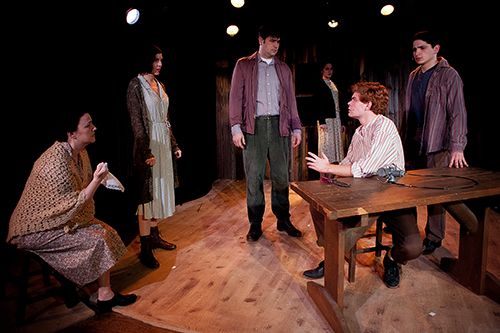 |
| Lisa Kotula, Louise Mason, David Janosik, Sigrid Lampe, John Mincks, Joel Vazquez Photo by Robyn O’Neill |
LAIBALE
I can get out. I’ve done it already, to get Mama’s medicine.
NESE
No, Laibale! Already they are watching you.
MOSHE
Take her where, Laibale? How?
SHEINA
Stop this discussion right now.
LAIBALE
There’s a place in the fence on Panieru Street. It has been patched and comes apart.
MOSHE
How do you know this?
LAIBALE
Because Joel and I patched it.
NESE
Joel!
LAIBALE
Yes. He has been working on a way to escape to the woods.
NESE
Then let him. You will have nothing to do with this, Laibale.
MOSHE
Will it work, Laibale?
LAIBALE
If Joel will help me, yes. It will work.
SHEINA
Moshe. I am begging you. This is madness.
MOSHE
This is Sara. Our only daughter. Perhaps the last child in our family. We must take the risk, Sheina. How can we deny her this chance to survive?
(SHEINA exits, sobbing.)
NESE
God help this family.
ANOTHER SHEINA
I’m cold.
(ISRAEL attempts to put his arms around her. ANOTHER SHEINA exits.)
NESE
Come, Israel.
(NESE and ISRAEL exit.)
MOSHE
Where will you take her?
LAIBALE
To Father John. He will know what to do.
MOSHE
Are you sure?
LAIBALE
Yes.
MOSHE
Laibale, look at me.
Are you sure?
LAIBALE
Yes.
(MOSHE stares into LAIBALE’s eyes, then nods.)
Scene 7
(Outside, at the fence, minutes before first light: SHEINA, ANOTHER SHEINA, NESE.
PROJECTION: Birds on a wire.)
ANOTHER SHEINA
Thrushes.
NESE
Finches, I think.
ANOTHER SHEINA
Why aren’t they singing?
NESE
It’s not quite dawn.
ANOTHER SHEINA
I had a songbird once. In a cage.
NESE
When was this?
ANOTHER SHEINA
I was just a girl. I set it free. My mother got very angry with me, but I didn’t care.
NESE
Didn’t you miss the singing?
ANOTHER SHEINA
No. A bird should not be in a cage.
(Beat)
NESE
You must be kinder to Israel, Another Sheina.
(ANOTHER SHEINA bristles.)
I know you did not ask my opinion, but Israel is my son, and it pains me to see you turn from him.
ANOTHER SHEINA
He did not stick up for me.
NESE
My dear, he has been sticking up for you since you got here. Before that, even. You don’t think I know, but he hides food and shares it only with you.
Oh, yes, I see it.
And you reward him with silence?
You don’t think it is hard enough for a man? You must withdraw as well?
ANOTHER SHEINA
He did not save my coat.
NESE
Are you meshuggah? He saved your life. You must forgive him.
SHEINA (hearing something)
What was that?
ANOTHER SHEINA
Not yet, Sheina. A few more minutes.
SHEINA
They will be calling for the count. If he’s not back—
ANOTHER SHEINA
He will be back.
SHEINA
What if he’s not?
ANOTHER SHEINA
Stop it.
SHEINA
It’s just . . . I put a note in the bag. I said she likes oatmeal and honey. Do you think the nuns have oatmeal and honey?
ANOTHER SHEINA
I’m sure they do.
SHEINA
What if she cries?
ANOTHER SHEINA
She won’t cry. The paregoric will keep her quiet.
SHEINA
Paregoric. God forgive me. What if she doesn’t wake up?
ANOTHER SHEINA
Stop it, Sheina. For the love of God. Sit.
SHEINA
I can’t sit.
(NESE has a coughing fit. ANOTHER SHEINA surreptitiously moves away.)
SHEINA
You’re getting worse, Nese.
NESE
It’s always bad this time of year.
SHEINA
I don’t think the medicine is working.
NESE
Just as well. Now Laibale will not have to sneak out of the ghetto anymore.
(NESE coughs.)
SHEINA
I’m worried about you, Nese.
ANOTHER SHEINA
You worry about everything.
SHEINA
Yes, I suppose I do. It’s funny, though. I don’t worry about you.
ANOTHER SHEINA
Why should you?
SHEINA
Exactly. You will always find a way, won’t you? Attach yourself to another family. Hoard bits of food until you have enough to bribe a guard. You will bounce back.
NESE
You are being unkind, Sheina. You must ask for forgiveness.
ANOTHER SHEINA
She is being ridiculous, is what she is being. I am supposed to apologize for being resourceful?
SHEINA
No . . .
ANOTHER SHEINA
What then? Tell me what I am supposed to do. All of you Gillmans look down on me like I am something Israel dragged off the street. You think you’re better than me. Well, I didn’t come from a family such as yours, it’s true. I’ve never seen a family argue as you do then turn around and have it be all over, as if nothing had happened. We never spoke openly of love, or forgiveness. You are all too much for me, at times. My heart is not used to such emotion; it cannot bear you. And this war! I am a stranger to myself.
NESE
We must not fight.
ANOTHER SHEINA
But that’s just it, Nese. We should fight. We should stand up to these . . . pigs. Look at what they have done to us. We are nothing but slave labor to them. I can see a stack of corpses on that next street corner, stacked like timber, and nobody blinks an eye anymore!
NESE
We must not fight with each other.
ANOTHER SHEINA
What is left? You want to hold my hand? You want to sing to me like a bird? You want to rub my head and tell me everything will be all right? Will that bring me back to myself? All I have left is hunger and anger and fight. So yes. Let’s fight with one another. I swear to God that is the only thing keeping me alive.
NESE
What about kindness?
ANOTHER SHEINA
There is no kindness.
(Beat.
SHEINA sits next to ANOTHER SHEINA, who bristles.)
Fly away, bird. There is not enough room for you here.
(SHEINA takes ANOTHER SHEINA’s hand.)
SHEINA
Everything will be all right.
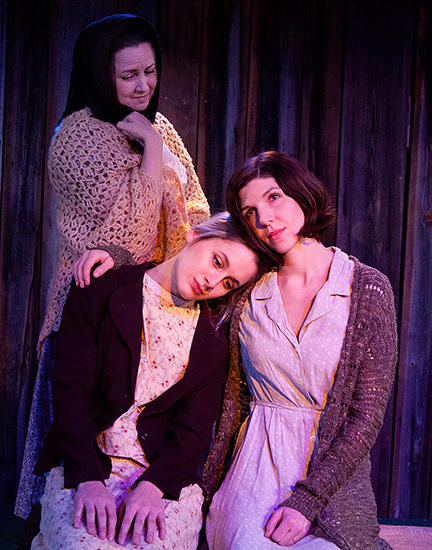 |
| Lisa Kotula, Sigrid Lampe, Louise Mason Photo by Robyn O’Neill |
ANOTHER SHEINA
Pfft. Now, who is meshuggah?
(She tries to pull away. SHEINA holds fast then sings a lullaby. We can imagine her singing it to Sara. ANOTHER SHEINA looks at her like she is crazy then is slowly seduced by the simple beauty of the moment. When SHEINA encourages ANOTHER SHEINA to rest her head, there is no resistance. In the distance, after a bit, we hear, “Roust! Schnell! Schnell!”)
SHEINA
Oh my God. Laibale will miss the count. What will we do? What will we do?
(ANOTHER SHEINA reaches into her pocket and pulls out bread.)
ANOTHER SHEINA
We will use our resources.
SHEINA
Where did you get bread!?
ANOTHER SHEINA
I don’t think the guard will care, do you?
(The women exit.)
Scene 7B
(LAIBALE enters with JOEL and MECK.)
JOEL
When they ask about Sara, tell them she died.
LAIBALE
But that is bad luck!
MECK
Hey. You do what you gotta do, brother.
LAIBALE
Who’s this guy again?
MECK
I’m Meck. I saw you win that race a few years ago. I’d never seen anyone handle a motorcycle like that. You practically flew!
LAIBALE
Yeah . . . thanks.
JOEL
Listen. If I don’t see you again—
LAIBALE
What are you talking about?
JOEL
Meck and I are joining the resistance fighters in the woods. I’m taking them the radio. They’ll pass it along.
MECK
We’re also taking them this.
(Shows a gun)
LAIBALE
What are you doing? Put it away.
JOEL
Listen, Laibale. The Gestapo knows people have been getting out of the ghetto. It’s only a matter of time before they find the patch in the fence. You can’t stay here. Come with Meck and me.
LAIBALE
I can’t leave my family. My mother is sick.
MECK
Hey, it’s every man for himself.
LAIBALE
I can’t.
(To Joel)
Can you do me one last favor?
JOEL
Hurry up with it.
LAIBALE
That liter of wool I asked you to keep at your house. Is it still there?
JOEL
It is. I hid it well.
LAIBALE
Good man. I want you to get it and drop it near the officer’s headquarters. The guard leaves his post all the time. Either he has a girlfriend or very weak bowels.
JOEL
You want the Germans to have your mother’s wool?
LAIBALE
Yes.
JOEL
Why?
LAIBALE
That’s my business.
MECK
We don’t have time for that, Joel.
JOEL
We’ll make the time.
Good luck, Laibale.
LAIBALE
. . . I’m never going to see you on this side of the fence again.
JOEL
I hope not. But catch you on the other side, eh? Come here.
(They embrace.)
Stay alive, Laibale. The war can’t last forever.
(And just like that, JOEL and MECK are gone.
In the distance, “Sixteen. Seventeen. Eighteen . . .”
MOSHE and SHEINA enter.)
MOSHE
Laibale!
LAIBALE
She’s safe.
(MOSHE faints. SHEINA helps him up.)
Let’s get in line.
(They run.
SOUND: Birds sing as the count continues.
Lights out. Then—
SOUND: Gunshots! Siren! Loudspeaker spouts frantic German commands.)
Scene 8
(In the woods.
PROJECTION: Archival photo of resistance fighters in the woods.
JOEL, dirty, exhausted, traumatized, talks to the resistance leader.)
JOEL
They got Meck!
It was my fault.
Laibale wanted me to take his mother’s wool to the officer’s quarters. Meck said we didn’t have time because you guys were in the woods waiting for us, but I did it anyway.
(He scratches.)
Because he is my friend, and he asked me to do it, so I did it.
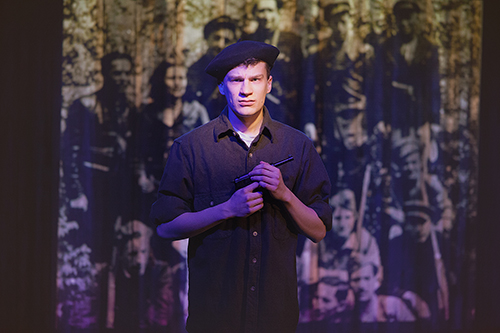 |
| Lucian Restivo Photo by Robyn O’Neill |
So after I dropped off the wool, I joined Meck at the fence. I went first.
We heard voices, and I guess Meck panicked. He fired shots . . .
(Beat)
I tried! But I dropped the radio, and it just broke apart. I picked up what I could, but Meck kept saying, run, run, and he threw me the gun. So I ran.
(Beat)
Yes, I have it. Here.
(Gives gun)
No, I had to leave the radio behind.
I don’t know how Meck got caught. I thought he was right behind me.
(Beat)
I said, I don’t know! I thought he was right behind me!
God!
I don’t know, I don’t know, I don’t know . . .
I’m sorry, all right?
. . . I’m so sorry.
Scene 9
(Office of COLONEL CRAMER.
PROJECTION: Archival picture of guard standing outside.
COLONEL CRAMER and LAIBALE.
There are several stuffed toys about, made out of ANOTHER SHEINA’s mink coat.
A radio’s copper coil spills like guts onto a table.
COLONEL CRAMER models a partially sewn jacket.)
COLONEL CRAMER
What do you think? I had a bit of problem along the placket, but it’s coming along very well, I think.
LAIBALE
Nice wool.
COLONEL CRAMER
It is, isn’t it? A gift to me, I think. I don’t know who left it. One of the women, surely.
LAIBALE
A secret admirer.
COLONEL CRAMER
Hee hee! Do you think? Perhaps so. Well, sit down, sit down.
No, stand up.
No, what the hell. Go ahead and sit.
I wish to show you something.
(Scratching his neck, he opens a desk drawer, pulls out LAIBALE’s medal.)
You have seen this before?
LAIBALE
My medal!
COLONEL CRAMER
Ah. You belong to it then.
LAIBALE
I won that in the motorcycle race!
COLONEL CRAMER
So I understand.
LAIBALE
Are you . . . are you going to give it back to me?
COLONEL CRAMER
Oh, yes. Of course. Certainly. You won it, correct?
LAIBALE
Yes . . .
COLONEL CRAMER
Then you must have it back.
(LAIBALE reaches for it.)
Tut, tut. First, you will tell me what I need to know.
You are aware we arrested your friend, Meck?
LAIBALE
Everybody knows that by now.
COLONEL CRAMER
And rightly so. We wish to make an example of him.
LAIBALE
Just for smuggling?
COLONEL CRAMER
No, little Jew. For firing shots at German officers from a stolen gun. I don’t give a shit about smuggling. As long as you people share with my guards, I am willing to turn away, especially since your mother was arrested, poor woman. Some of my men are too ambitious, is all. I am glad to hear no harm came to her.
Do you know why you are here, Laibale?
LAIBALE
No.
COLONEL CRAMER
Because it seems Meck is not inclined to talk.
LAIBALE
What do you want him to talk about?
COLONEL CRAMER
This radio, for one thing. Have you ever seen this radio before?
LAIBALE
No.
COLONEL CRAMER
I must warn you, Laibale. It will not go well for you if you lie to me. People have a way of disappearing in the ghetto. By the way, my condolences. I understand you lost a little niece. Such a shame when one dies so young. I did not know she was even sick.
LAIBALE
It was sudden. Sheina is heartbroken. I mean, we all are.
COLONEL CRAMER
Yes, yes, heartbroken. An interesting word, don’t you think? Because the heart, I am not sure it can be broken, per se. But the bones? The bones are another thing. And when bones are broken, it hurts very badly. You could ask Meck about this, but of course, he is not available at the moment.
(Picks something from his neck, looks at it, flicks it)
LAIBALE
Yes.
COLONEL CRAMER
Yes? Yes what?
LAIBALE
Yes, that is my radio.
COLONEL CRAMER
Aha! The memory returns.
LAIBALE
But we gave it up when you guys told us to. We brought it out. So what happened to it after that, I have no idea. Maybe you should be asking the Gestapo how Meck got it.
COLONEL CRAMER
Thank you, little Jew, for knowing exactly what is best for me, and for so kindly advising me on how to manage my staff.
LAIBALE
I’m just trying to—
COLONEL CRAMER
Don’t try!
(Beat)
Where was this radio going, Laibale?
LAIBALE
Is Dr. Elkes—?
COLONEL CRAMER
Coming? No. I will ask you again. Where was Meck taking this radio?
LAIBALE
I don’t know.
COLONEL CRAMER
To the forest, perhaps?
LAIBALE
I said, I don’t know.
COLONEL CRAMER
How many are hiding in the forest, Laibale?
LAIBALE
I don’t know.
COLONEL CRAMER
How many guns do they have?
LAIBALE
I don’t know anything about guns.
COLONEL CRAMER
Who else escaped through the fence last night?
LAIBALE
I don’t know. I wasn’t there.
COLONEL CRAMER
Somebody named Joel?
Is that correct?
LAIBALE
Colonel Cramer, I don’t know anything.
COLONEL CRAMER
You don’t know anything? Do you know what happens to Jews who don’t know anything?
(LAIBALE shakes his head.)
This!
(COLONEL CRAMER snatches up LAIBALE and forces him to look out the window.)
Look out there! Look! Do you see that, Laibale? Do you?
LAIBALE
Yes.
COLONEL CRAMER
And what do you see?
LAIBALE
A gallows.
COLONEL CRAMER
And at noon tomorrow, Meck is going to swing from that gallows, and every single person in this goddamned ghetto is going to walk by in single file and look into his bloody Jewish face. And when I am finished with him, I will kill his family. Do not think I will not do the same with you.
LAIBALE
You’re. Hurting. Me.
COLONEL CRAMER
I have been patient with you, Laibale. I have looked the other way when you and your little friends defy my orders. I look the other way when I see that your mother is old and sick and should have been eliminated long ago. But I see what you are doing here. Don’t think that I don’t. You may be a talented little kike, but you are not indispensable, and you will tell me what Meck was doing with radio or I will kill you, do you understand that?
(Drops him suddenly)
Goddamn, I am itching like a filthy Jewish bastard! Augh!
(He rips the half-sewn coat from his body, throws it on the floor, rips off his shirt.)
COLONEL CRAMER
Lice! I have lice! AUGH!
(LAIBALE grabs his medal and runs for his life.
Light change.
SOUND: Echo effect of COLONEL CRAMER screaming or perhaps bells tolling.
PROJECTION: ESTHER’s drawing of MECK hanging from the gallows.)
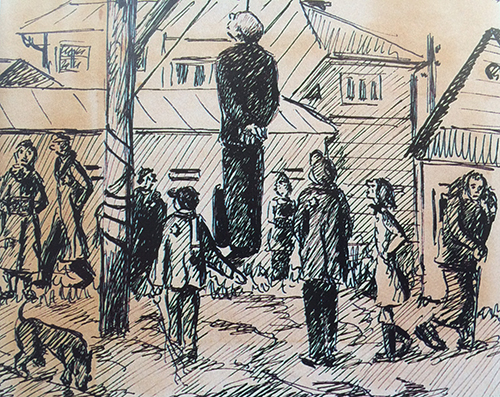 |
| From Hidden History of the Kovno Ghetto (1997) United States Holocaust Memorial Museum |
Scene 10
(Near the ghetto gate)
PETRAS
Over here! Quickly!
(LAIBALE and NESE enter.)
NESE
Is that Petras? How is your mother, dear?
LAIBALE
Shh, Mama.
NESE
He looks so grown up.
(Coughs)
LAIBALE
I can’t thank you enough.
PETRAS
Save it. Through here. Hurry up.
(Distant yelling, in German. “Over there! Get the dogs! Shine a light!” etc.)
LAIBALE
We’re going to have to move fast, Mama. Lean on me.
NESE
What about Moshe and Israel and the others?
LAIBALE
I’ll come back for them later.
Where is the motorcycle?
PETRAS
Beneath the bridge. Take it to the church in Zezmer. There is a priest there. Father Bruno. He knows where the resistance force is hiding. Stay out of the town. Do not follow the river. It’s the first road they will search.
LAIBALE
Petras, I—
(LAIBALE and PETRAS embrace.
More yelling.
Nearing lamplights throw beams.)
PETRAS
Get the hell out of here!
(They go.
CAPTAIN LEITUKIS enters.)
PETRAS
Valter! My God, look at you! Long time, no see! Remember me? Petras Repsytus.
CAPTAIN LEITUKIS
Where are they?
PETRAS
Who?
VALTER
Don’t play with me, Jew.
PETRAS
Oh, you mean Laibale and his mother? You just missed them! They’re following the river. I’m Catholic, by the way—!
(CAPTAIN LEITUKIS shoots PETRAS. He falls dead.)
CAPTAIN LEITUKIS
The river! Hurry!
Scene 11
(A bunker in the ghetto.
DR. ELKES, ESTHER, GEORGE, RABBI SHAPIRO assemble materials.
PROJECTION: Archival picture of ESTHER’s watercolors.)
DR. ELKES
We must include all your sketches, Esther.
ESTHER
I will give you a few, but I have hidden the rest carefully, Dr. Elkes.
DR. ELKES
Inside the pottery?
ESTHER
How did you—?
DR. ELKES
If I know, others will know. And if there is a fire—please allow me to preserve them for you.
GEORGE
These are the last of my photos, Doctor.
DR. ELKES
Nearly one thousand of them. Do you realize that, George?
GEORGE
That many?
DR. ELKES
What have we here, Rabbi Shapiro?
RABBI SHAPIRO
Joel’s accounting, Dr. Elkes.
(PROJECTION: Archival picture of “Numbers That Demand an Accounting!”)
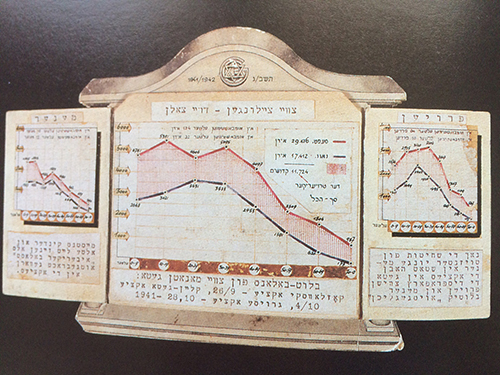 |
| From Hidden History of the Kovno Ghetto (1997) United States Holocaust Memorial Museum |
RABBI SHAPIRO
A memorial plaque. The doors open to reveal the fate of Kovno’s Jews. The men, women, children who were murdered. They will never be forgotten.
DR. ELKES
Joel did this? It is . . . beautiful. And this?
(PROJECTION: Archival picture of “And These are the Laws—German Style.”)
RABBI SHAPIRO
A compilation of decrees and orders issued by the Germans. Dates, copies of the orders, and the issuing commanders. They may destroy all the evidence they can, but they will have their reckoning.
DR. ELKES
As will we, Rabbi. Ah. The almanac. Very good.
(PROJECTION: Archival picture of yearbook.)
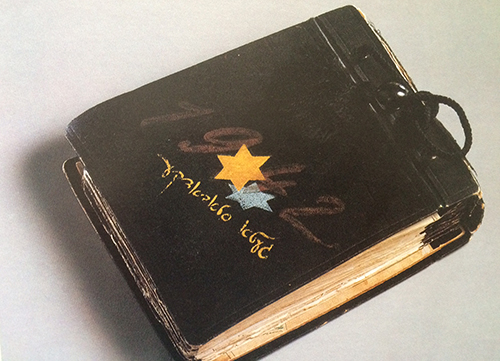 |
| From Hidden History of the Kovno Ghetto (1997) United States Holocaust Memorial Museum |
RABBI SHAPIRO
The folk songs, poetry, illustrations of ghetto insignia and armbands. Signs, symbols, more works of graphic arts. . . . Also, by my hand, a detailed history of the Jewish Ghetto Police. And here, Dr. Elkes, I took the minutes of all the meetings, testifying to your leadership on the Jewish Council, how you saved families from certain death.
DR. ELKES
Oh, now.
GEORGE
We’ll need crates for all this.
ESTHER
What will we do with it all?
DR. ELKES
Bury it. And then, one day, unearth it.
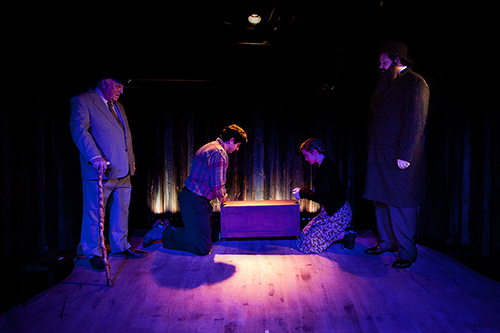 |
| John Hagadorn, Axle Burtness, Tricia Wiles, Jacob Lief Photo by Robyn O’Neill |
GEORGE (gesturing to all)
Draw in.
(Light change as they huddle, intertwined)
GEORGE
We swear to tell no one of the existence or location of these treasures. No matter what. Even if it means we get hurt.
ESTHER
We will protect our renderings.
GEORGE
Our photographs.
RABBI SHAPIRO
Our words.
DR. ELKES
Our history. May we always know who we are, from whence we came, and what we have endured.
(Music brings us into next scene.)
Scene 12
(In the woods, near Zezmer.
NESE and LAIBALE ride onto the stage on the motorcycle. NESE looks weak.
PROJECTION: Dark birds.)
NESE
Why are we stopping?
LAIBALE
I wanted to see this place one last time.
(SOUND: Bird.)
NESE
I remember now. Where the birds light.
LAIBALE
Yes.
NESE
We are near Zezmer then.
LAIBALE
How are you feeling?
NESE
Dead.
LAIBALE
Don’t say such a thing. Shall we rest?
(He helps her off the bike, then places his jacket on the ground. Mock formal.)
Would you care to sit, my lady?
NESE
Borscht and kugel.
LAIBALE
What?
NESE
Every night. Borscht and kugel.
LAIBALE
Here. Lie down.
NESE
Not yet. I might not get back up.
LAIBALE
Stop that!
NESE
Your father hated borscht and kugel. I could make many other things, but after I got mad at him, I only made for him borscht and kugel. What sort of a wife does something like that?
LAIBALE
Are you okay?
NESE
And then keeps doing it?
LAIBALE
It was good! In fact, I wish we had some now.
NESE
Why couldn’t I let that go? I lecture Another Sheina about Israel, yet I am guilty of the same pettiness.
LAIBALE
I think you’re tired, Mama. I could feel you growing weak behind me.
NESE
So many things.
LAIBALE
Why don’t you try to go to sleep for a few minutes?
NESE
Sara.
LAIBALE
She is safe.
NESE
I will never see her again.
LAIBALE
Of course you will. Let me get you some water.
NESE
I have a lot of pictures in my head.
LAIBALE
Oh?
NESE
My wedding photo.
(Beat)
I don’t look very happy.
LAIBALE
Well.
NESE
Moshe, as a baby. Then Israel. And you. My little lion.
(LAIBALE brings her a cup of water and hard salami.)
LAIBALE
Salami! Another Sheina must have dipped into her stash. So generous of her. I’m sure it was all she had.
NESE
I am foolish to wish for better times. There is pain wherever you look. And we all carry around our own little cup of it.
LAIBALE
Shhh. Drink.
NESE
Where are the cups of kindness?
LAIBALE
They are small, Mama, but we drink from them. Thanks to Another Sheina, we eat from them as well.
NESE
Where am I to go, Laibale?
LAIBALE
Father Bruno will advise us.
NESE
No, I mean for eternity.
LAIBALE
Heaven, of course. But not for a long time yet.
(A lantern casts a light.)
LAIBALE
Who is there?
(Silence)
What do you want?
NESE
What is happening, Laibale?
LAIBALE
I’m not sure.
(Packing up)
We have to go.
NESE
But you said we should rest . . .
LAIBALE
I know. I’m sorry.
(ENSEMBLE on stage, as in the top of Act 1. Low backlight keeps them in silhouette. They are still.)
LAIBALE
You steady?
NESE
As a one-legged goat.
(Add lines here if more time is needed to get NESE situated on motorcycle.)
LAIBALE
Here we go.
(As LAIBALE attempts to start the bike, ENSEMBLE vocally imitate, slowly at first, the sound of a motorcycle engine being turned over.)
ENSEMBLE
Tick.
Tick.
Caw.
Harumpf.
Tick.
Harumpf. Clunk.
Tick.
Ca-caw.
Chirp.
Tweet.
Harummmmmmmmmm, chug, rattle, clunk.
Caw caw.
Tick.
LAIBALE
Come on, Icarus.
(But this time, the engine does not turn over.)
NESE
Why won’t it start?
LAIBALE
I don’t know. It was fine before.
NESE
Maybe it will start in the morning, Laibale.
LAIBALE
I know you’re tired, Mama, but we can’t stay here. That might have been a German soldier. He will bring others. Can you walk?
NESE
I don’t think so, Laibale. I’m sorry.
(ACTOR #1 steps out.)
ACTOR #1
Hello.
(They react.)
Do you need help?
NESE LAIBALE
Yes! Thank you! No. We’re good.
NESE
We’re looking for Father Bruno. Do you know him?
(ACTOR #2 steps out.)
ACTOR #2
You’re Catholic then?
NESE LAIBALE
No. Yes.
(The number of actors available to “step out” as TOWNSPEOPLE will determine how the lines are distributed.)
TOWNSPEOPLE
Are you out of gas?
We can take you to a gas station.
We have a truck.
NESE
They have a truck, Laibale!
LAIBALE
I can hear, Mama.
TOWNSPEOPLE
What’s going on?
Who is that?
What are you doing here?
Where are you going?
LAIBALE
My mother is sick. We are trying to find a doctor.
TOWNSPEOPLE
I thought you said you were looking for a priest.
LAIBALE
We are looking for a priest and a doctor.
TOWNSPEOPLE
(They have shotguns.)
No priests around here.
No doctor either.
NESE
Laibale.
LAIBALE
Stay calm. We’re okay. They are not German.
TOWNSPEOPLE
No, we are not German.
We are Lithuanian.
What’s that around your neck?
I know you!
You’re the Jew who won that race in Slobodka.
NESE LAIBALE
Yes! No!
TOWNSPEOPLE
Well, which is it?
Yes or no?
LAIBALE
You’re mistaken. We don’t live around here.
TOWNSPEOPLE
Where do you live?
The ghetto in Kovno, I’ll bet.
They escaped!
NESE
No!
TOWNSPEOPLE
They’re Jews!
What are you doing out of the ghetto, Jews?
LAIBALE
I told you, my mother is sick!
TOWNSPEOPLE
It is him! The Jew who won the race. Look! He wears the medal around his neck!
LAIBALE
Mama. We have to run.
NESE
I cannot, Laibale. I cannot.
TOWNSPEOPLE
Nobody is running anywhere.
(NESE’S knees buckle. LAIBALE supports her.)
We don’t want Jews in our town.
We already got rid of all of you once.
We can’t let another one back in.
Pretty soon, there’s another one, and another one.
They hatch like vermin.
Ha ha.
You have to get rid of them all at once.
LAIBALE
Help us leave then.
TOWNSPEOPLE
Jew boy!
Take off that medal, Jew boy.
Well? We’re waiting.
LAIBALE
If I give it to you, will you let us go?
TOWNSPEOPLE
(Points gun at NESE’s head)
Take it off.
(LAIBALE takes off the medal.)
And your clothes. Her, too.
LAIBALE
No.
TOWNSPEOPLE
Both of you.
LAIBALE
No.
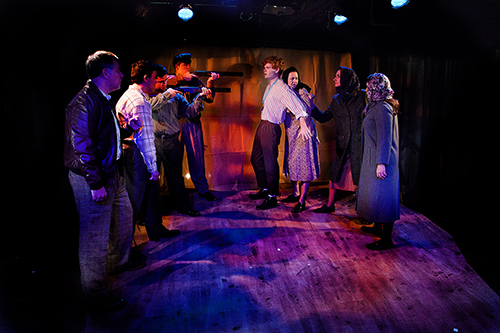 |
| John Mincks, Lisa Kotula, and the cast of The Little Lion Photo by Robyn O’Neill |
NESE
It’s all right, Laibale.
LAIBALE
No, Mama!
TOWNSPEOPLE
Take off your clothes.
NESE
I love you, my little lion. You have always been so brave. It is my turn to be brave. But I never imagined I would have be brave against my own countrymen.
(The TOWNSPEOPLE close in.)
TOWNSPEOPLE
Take off their clothes.
LAIBALE
Mama.
(The TOWNSPEOPLE move in. All action is suspended.)
REBEKKAH
Dear Laibale,
Last night I dreamed I saw you and your mother in the woods near Zezmer, where you and I became husband and wife. I wanted so badly to be with you. I am married to Eric now, Laibale, but I love you still. I always will.
GEORGE
They are turning the ghetto into a concentration camp! Jews arrive from all over Europe, and are quickly executed or sent to Estonia to starve in slave labor camps. I am honoring our pledge, Laibale. As long as I can see, I will take pictures.
ESTHER
They burned the ghetto to the ground! Thank God I listened to Dr. Elkes and took my paintings out of the pottery. They are all I have left of Menachim. I still have the one I drew of you, too, Laibale, when you won the race. You seemed so young then. We all did. Not anymore.
DR. ELKES
I have been moved to Germany to work in the hospital at Landsberg Concentration Camp. I still hear the pleas of the families I could not save. My eyes are coals. Words are ashes in my mouth.
JOEL (wearing garb of the resistance forces)
No one calls me Typhus Boy anymore. It might have something to do with this.
(Shows his rifle)
RABBI SHAPIRO
The Germans found out about the archives, but I would not tell them where the crates were buried, not even after they ripped the ears from my head. I am at peace.
VALTER
You cost me my life, you little shit. If I’d killed my father a long time ago, maybe I wouldn’t have had to kill myself.
ISRAEL (with ANOTHER SHEINA)
We got out. When I heard about you and Mama—
I will find you, Laibale, and give you a proper burial. This is my promise.
ANOTHER SHEINA
Were it not for you, Laibale, we would have perished with the others. You and your family showed me kindness, and taught me how to love.
(She and ISRAEL share a look.)
Israel and I are to be married soon. If we have a son, we will name him Laibale. If we don’t have a son, a grandson will be named for you. We will always remember you.
MOSHE (with SHEINA)
Sara lives. Our perfect child.
SHEINA
Thanks to you, she will become a medical doctor. A doctor, Laibale!
(Return to the scene.
Behind a scrim, there is a struggle, sounds of resistance, then overpowering. The armed TOWNSPEOPLE take aim.
Blackout.
SOUND: Distant gunfire, then a rush of birds on the wing, agitated.
FINAL TABLEAU: Crates of archival materials.) ![]()